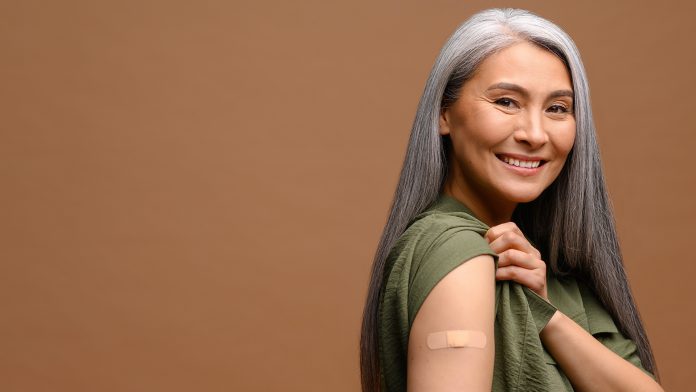
Vaccine confidence has fallen to pre-pandemic levels but, says Sibilia Quilici, Executive Director of Vaccines Europe, there is a need and value in boosting immunisation for people of all ages.
The COVID-19 pandemic provided a stark illustration of how infectious diseases can cause serious illness, put pressure on health systems and disrupt the economy. The pandemic also showed how the fear of infection for ourselves or loved ones can generate anxiety and depression.1 It revealed several weaknesses and inequities which must be addressed if we are to build resilient systems and prioritise preventative health, ready to respond to the next crisis when it comes.
However, we have also seen several positives in how authorities, institutions and policymakers responded with urgency and creativity: putting an unprecedented focus on adult vaccination, setting up new vaccination points, mobilising pharmacists to provide convenient access to vaccination, and tracking outbreaks and vaccine uptake.
Although COVID-19 continues to circulate in every EU country, it is time to consider the legacy of the pandemic. The question now is: what lessons can we learn from this shock to the system about the implementation of routine vaccination programmes?
One of the biggest threats we face is a return to business as usual. The pandemic prompted millions of adults to engage with immunisation services for the first time in many years. If we fail to harness the momentum generated since 2020, history will record it as a missed opportunity.
Capturing momentum from the COVID-19 pandemic
While this is a chance to reinvent immunisation systems to protect people of all ages, we know that human beings can be complacent. Consider the report on the ‘State of Vaccine Confidence in the EU 2022’2 published by the European Commission in November. The study, conducted by the Vaccine Confidence Project, is the third in a series looking at public perceptions of vaccines in 2018, 2020 and 2022. It shows that after significant gains in vaccine confidence in 2020 – particularly towards the seasonal influenza vaccine – attitudes have largely returned to pre-pandemic levels.
It should also be noted that while most people in Europe trust vaccines, there are significant differences between countries and age groups. There is a ‘vaccine confidence gap’ between people over 65 and those in the 18-34 age group: the younger group is less confident now than in 2018. Alongside the contribution of complacency, the pandemic-fuelled polarisation of vaccine conversations, particularly online, may have had a negative impact on those who are most reliant on social media for information.
The study also puts the spotlight on differences between countries, with Portugal and Spain reporting the highest levels of confidence, and Slovakia and Latvia reporting the lowest. In light of this, it is perhaps not surprising that vaccine coverage for flu and COVID-19 – especially for adult vaccines – is markedly better in western EU Member States than in countries in Central and Eastern Europe.3,4
The report shows that the improvements in confidence seen in 2020 have faded. We should also be concerned that the public may revert to viewing immunisation as primarily a matter for children’s health.
After a pandemic which proved the urgency of vaccinating older and vulnerable people, it is time to raise adult immunisation to the same level of priority that we attach to protecting children against vaccine-preventable diseases.
Protection for all: The importance of preventative health
As we move away from crisis mode, we can embark on a new era for routine life-course immunisation. To achieve this, we need sustainable financing for vaccines that are recommended for people of all ages. Despite the current economic situation, this must be viewed as an investment rather than a cost. Indeed, for every €1 of public money invested in vaccines for people aged 50 and older, governments can expect to gain €4 in future economic revenue.5
In addition, as this winter has illustrated, preventing flu, RSV, pneumococcal disease, COVID-19 and other life-threatening or debilitating respiratory illnesses is essential to health system resilience. In many EU Member States, hospitals and primary care services were overwhelmed by patients suffering preventable viral illnesses, adding to the pressure on healthcare workers and disrupting elective procedures.
It is also vital, in the interests of equity across Europe, that new vaccines promptly reach people, regardless of where in Europe they live. Today, while Europeans in Belgium and France wait less than two years to access newly approved vaccines, those in Croatia and Estonia can wait more than six years.6
Not only is this unfair, but it sends the wrong signal about the priority we attach to preventative health. And, with more than 100 vaccine candidates in the pipeline7 – most of which will target adults – it is crucial that there is a pathway to public funding for innovative vaccines, recognising their full value.
Timely data is required
We need to set vaccine uptake targets and collect data to track progress. At present, we know too little about rates of disease and vaccination.

We need to set vaccine uptake targets and collect data to track progress. At present, we know too little about rates of disease and vaccination
The Pneumococcal Vaccination Atlas8, published in January by the Coalition for Life-Course Immunisation and the International Longevity Centre, illustrates striking differences in the availability of data on vaccine coverage in children and adults across Europe. It reveals a patchwork of recommendations and reimbursement policies, with disparities between the availability of pneumococcal vaccines for children and older people. As is too often the case, older people are missing out.
Among the positive elements of the pandemic response was the availability of timely and harmonised information on case numbers and vaccination uptake across all EU Member States. The European Centre for Disease Prevention & Control’s COVID-19 Vaccine Tracker9 provides timely, granular, publicly accessible data broken down by country and age group. It shows vaccination uptake for the whole population, adults only, and over-60s.
The lasting legacy of the pandemic should be the establishment of systems to collect and share data for all vaccine-preventable diseases. This would support evidence-informed policymaking and prompt action to intervene when an outbreak occurs or pre-emptive local campaigns when vaccine uptake is too low.
Immunisation at a crossroads
At a policy level, there are reasons for optimism that the EU has accelerated the shift towards life-course immunisation. In December, EU health ministers agreed European Council Conclusions10 which aim to enhance adult immunisation campaigns and establish an expert forum on vaccine hesitancy.
Meanwhile, HPV vaccination for adolescent girls and boys will play a central role in addressing cervical cancer – a priority of the Europe Beating Cancer Plan.11 By ensuring that national cancer plans monitor the status of HPV and Hepatitis B vaccination, the EU can play an oversight and coordination role in raising standards across Europe.
These initiatives are welcome. This is a spirit we should apply to all vaccine-preventable diseases – not just COVID-19 in a time of crisis, and not just HPV vaccination in the context of eliminating cervical cancer as a public health concern.
Let’s join the dots. Routine life-course immunisation should be viewed as an essential service. Public confidence in vaccines must be fostered on an ongoing basis, with timely, free, and equitable access to new, recommended vaccines. And we need to strengthen immunisation information systems to ensure a data-driven future for preventative health.
To succeed, we know what is needed: political will, an adequate and sustainable immunisation budget, and data on programme performance.
If we truly believe that preventative health is better than cure, now is the time to show it.
References
- https://www.who.int/news/item/02-03-2022-covid-19-pandemic-triggers-25-increase-in-prevalence-of-anxiety-and-depression-worldwide
- https://health.ec.europa.eu/publications/state-vaccine-confidence-eu-2022_en
- https://ec.europa.eu/eurostat/web/products-eurostat-news/-/ddn-20191209-2
- https://vaccinetracker.ecdc.europa.eu/public/extensions/COVID-19/vaccine-tracker.html#uptake-tab
- Supporting Active Ageing Through Immunisation (SAATI) Partnership (2018). Adult vaccination: a key component of healthy ageing. https://ilcuk.org.uk/wp-content/uploads/2018/11/Adult-vaccination_a-key-component-of-health-ageing.pdf (Accessed September 2021)
- Laigle, V. et al., ‘Vaccine market access pathways in the EU27 and the United Kingdom – analysis and recommendations for improvements’, Vaccine 39 (2021): https://pubmed.ncbi.nlm.nih.gov/34404557/
- Vaccines Europe reveals its first pipeline review – Vaccines Europe
- Pneumococcal Vaccination Atlas – Homepage (pneumoniaatlas.org)
- COVID-19 Vaccine Tracker | European Centre for Disease Prevention and Control (europa.eu)
- Vaccination: Council calls for combatting vaccine hesitancy and closer EU cooperation – Consilium (europa.eu)
- Europe’s Beating Cancer Plan (europa.eu)
This article is from issue 25 of Health Europa Quarterly. Click here to get your free subscription today.

























